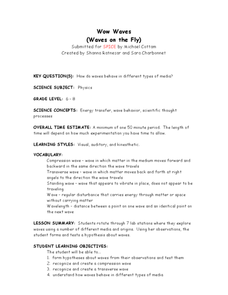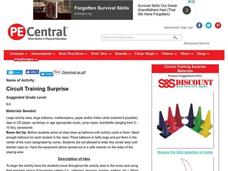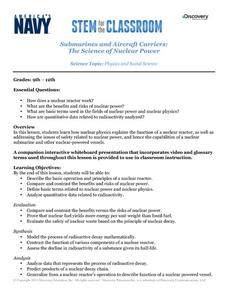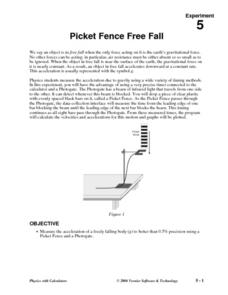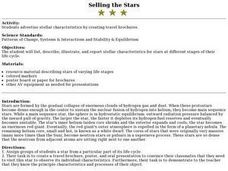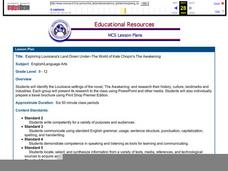Curated OER
Trajectory and Range of a Projectile
Students investigate the factors affecting projectile trajectory. In this physics lesson, students calculate the range, time and speed of projectiles using mathematical equations.
Curated OER
Wow Waves (Waves on the Fly)
Students formulate hypotheses on wave behavior and test them. In this physics lesson, students compare and contrast transverse and compression waves. They determine the wavelength of transverse waves.
Curated OER
Circuit Training Surprise
Students move around the gym to music, and when the music stops, they sit on a balloon. Inside each balloon are directions for another physical activity students should do.
Curated OER
Speedy Trials
Fifth graders investigate how forces affect the motion of an object. In this physics lesson, 5th graders calculate an object's speed using a mathematical formula. They discuss how force and mass affects the speed.
Curated OER
Field of Fun Day
Students get to showcase many of the different activities taught during their year in physical education classes. They also get to perform some activities just for fun.Great end of the year activity.
Curated OER
Race the Track! Design Challenge
Students use the design process to investigate physical science. For this force and motion lesson, design a track to achieve a specified outcome. Students complete additional experiments with speed and distance. Students...
Curated OER
Acceleration, Drag, Gravity, Motion, Forces, and Friction
Eighth graders build and run mousetrap cars in order to measure distance, time, and mass for their cars. They use these measurements to calculate average speed and kinetic energy, then create a slide show to visually explain how the car...
Curated OER
Comparison of Different Methods for Determining Stream Flow at a Stream Site
Students make measurements and calculations to determine the stream flow of an outdoor stream site. In this stream characteristics lesson, students travel to a field site to construct a transect across a stream and measure the...
Curated OER
So Fast! So Slow!
Fifth graders give examples of objects that move slow and fast. In this physics instructional activity, 5th graders rank animals according to how quickly they move. They create a bar graph of organisms versus rates of speed.
Curated OER
Rope Volleyball
Students use a jump rope as a net and volley a ball or balloon over the net a specified number of times. They work cooperatively and improve their eye-hand coordination as they play a fast-paced game of jump-rope volleyball.
Discovery Education
Submarines and Aircraft Carriers: The Science of Nuclear Power
As physics masters view this presentation, they learn how nuclear power is used in submarines. They use Google Maps to plot a course through the ocean and calculate the time required for surfacing and traveling. They learn about fission,...
Curated OER
Math for the Frontier
Make history come to life by using the Frontier House series to engage learners in the past. Your class will "prepare" for a trip to 1833 Montana. They will learn about homesteading, frontier life, inflation, and cost of living. Using...
Curated OER
The Basics: Physical Science
Students view a video on friction and examine how friction and gravity affect some sports. In this investigative lesson students write a paragraph and draw a picture that illustrates how friction and gravity affect sports.
Curated OER
Picket Fence Free Fall
Students measure acceleration using a Picket Fence and a Photogate. For this physics lesson, students drop an object and measure the acceleration of the object free falling. They log their data using the TI.
Curated OER
Backseat Travelers
Fourth graders investigate the geography of the Southeast regions of the United States. They conduct Internet research, listen to the book "No Star Nights," and plan and write a trip through this regions.
Curated OER
Selling the Stars
Students create a travel brochure, poster, and presentation to encourage others to visit a star. For this stellar characteristics lesson, students research a star type based on its life-cycle. They create a travel campaign to convince...
University of Colorado
Spacecraft Speed
Space shuttles traveled around Earth at a speed of 17,500 miles per hour, way faster than trains, planes, or automobiles travel! In the 13th installment of 22, groups graph different speeds to show how quickly spacecraft move through...
Cornell University
Sound Off!
Time to witness the effects of sound. Learners analyze different materials to determine their abilities to absorb sound waves. They use free software to monitor the amplitude of the waves to verify results.
Friends of Fort McHenry
Cannons During the War of 1812
During the Battle of Baltimore in the War of 1812, only 25% of the bombs and rockets fired at Fort McHenry actually reached their target. Using an interactive online simulation, combine your historical study with physics and...
Rainforest Alliance
How Far Away Is a Tropical Rainforest?
If driving to school only takes 10 minutes, then how long does it take to drive to a tropical rainforest in Colombia? Explore the focus question in a activity that uses measurement tools and formulas to figure out the time and...
Curated OER
Waves and Currents
Students are introduced to the forces that are responsible for generating waves in the ocean and how these forcesf differ from those that cause currents. They are able to explain how water molecules in a wave do not move in the direction...
NASA
Photons in the Radiative Zone: Which Way Is Out? An A-Maz-ing Model
Can you move like a photon? Young scholars use a maze to reproduce the straight line motion of a photon. The second in a six-part series of lessons on the sun has learners measure angle of incidence and refraction to determine the path...
Curated OER
Exploring Louisiana's Land Down Under - The World of Kate Chopin's The Awakening.
Visit 19th century Grand Isle, Cheniere Caminada, and New Orleans! Meet the inhabitants, learn about their history and culture, and view landmarks and industries! After reading Kate Chopin’s The Awakening, class groups research the...
NASA
Newton Car
If a car gets heavier, it goes farther? By running an activity several times, teams experience Newton's Second Law of Motion. The teams vary the amount of weight they catapult off a wooden block car and record the distance the...

